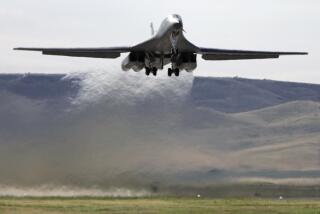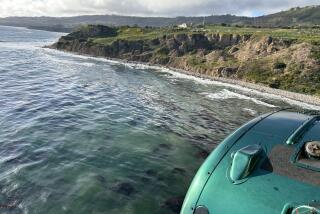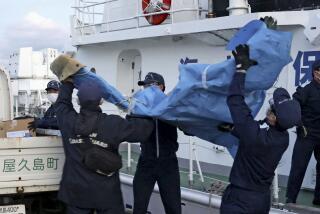B-1 Crashes at Sea; Crew of 4 Rescued
An Air Force B-1B bomber headed for a mission over Afghanistan crashed into the Indian Ocean on Wednesday after experiencing “multiple malfunctions” shortly after taking off from the island of Diego Garcia.
All four crew members ejected from the $200-million bomber before it crashed into the ocean about 30 miles north of the island, Pentagon officials said. The crew members, who suffered minor injuries, were rescued by a U.S. Navy destroyer that was in the area.
It was the first crash of a fixed-wing U.S. aircraft since military operations began in Afghanistan two months ago, and it marked the seventh B-1 bomber to be lost since the troubled plane first rolled off the Palmdale production line in 1985. Three special operations helicopters have also been destroyed during the Afghan campaign.
The crash comes just as the B-1 fleet was receiving recognition for its contribution in Afghanistan, the first major conflict in which it has been used. The B-1, one of the most maligned U.S. aircraft in recent history, has dropped a majority of the bombs in the central Asian country.
In a satellite telephone interview from Diego Garcia shortly after his rescue, the pilot of the B-1 said the crew was “flying a normally scheduled mission” when the aircraft went out of control and the crew was forced to eject.
“We had multiple malfunctions,” said Capt. William Steele, a member of the 28th Bomb Wing out of Ellsworth Air Force Base in South Dakota. “The aircraft was out of control and we all had to eject.”
A Pentagon spokeswoman said the bomber was about 100 miles north of Diego Garcia when it began to experience trouble, which prompted the crew to turn the plane around and head back toward the base.
Unable to fix the problems, the crew ejected from the bomber when it was about 60 miles from the island and flying at about 15,000 feet, according a Pentagon official and the pilot. The crewless plane flew another 30 miles before crashing into the sea at about 10:30 p.m.
Diego Garcia, a British island in the central Indian Ocean, is being used as a base by the U.S. military for combat missions over Afghanistan.
Pentagon officials and the pilot declined to say whether the plane was loaded with munitions, or if it went down with any weapons aboard. They also refused to describe the “multiple malfunctions,” pending an investigation.
“We were attempting to land at Diego Garcia,” Steele said, adding that the crew was in the water about two hours before being rescued. “We didn’t see any hazards, no sharks or anything like that. Actually, it was kind of comfortable. It was nice, warm water.”
The bomber--built by Rockwell International, which later sold its aerospace business to Boeing Co.--has had a checkered history. Originally designed to drop nuclear weapons deep inside the Soviet Union during the Cold War, it later was converted for use in conventional warfare.
Four crew members were killed when a B-1 bomber crashed in Montana in 1997. An investigation later blamed the pilot for trying an uncommon maneuver moments before the crash.
In 1987, a B-1 bomber crashed after striking a large bird while flying near La Junta, Colo., killing three crewman. Three others ejected safely. After that crash, the Air Force limited the crew size to four, the number of ejection seats in the aircraft.
A year later, a B-1 crashed near Dyess Air Force Base in Texas after the aircraft caught fire, which the Air Force attributed to a design flaw. The crew parachuted to safety.
Still, pilots have been unusually loyal to the airplane, which has undergone extensive modifications to improve its radar-jamming and weapons-carrying capabilities.
Asked how the plane was holding up over Afghanistan, Steele said:
“The B-1 has been doing outstanding since we’ve been here. We have a very high mission-capable rate and very few systems malfunctions. It’s an outstanding aircraft; just sometimes things go wrong.”
More to Read
Sign up for Essential California
The most important California stories and recommendations in your inbox every morning.
You may occasionally receive promotional content from the Los Angeles Times.










